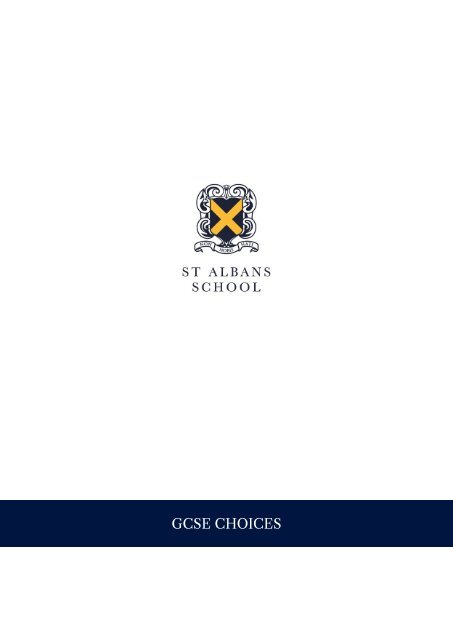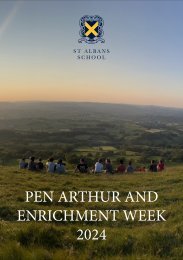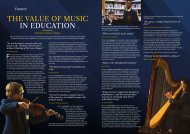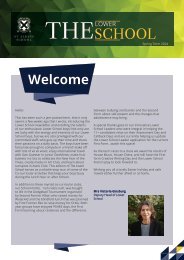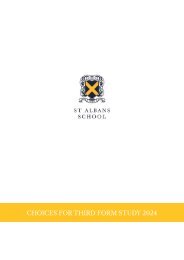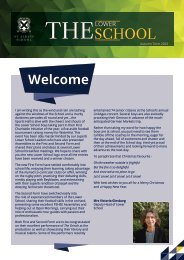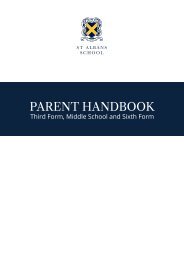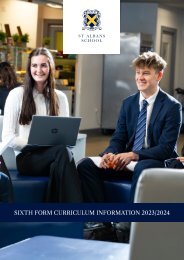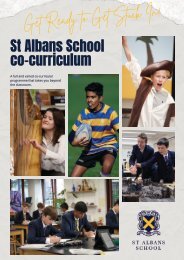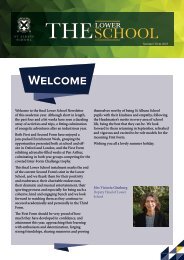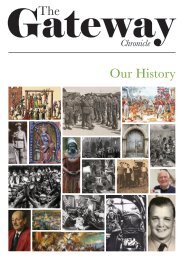GCSE Choices Booklet 2023
Create successful ePaper yourself
Turn your PDF publications into a flip-book with our unique Google optimized e-Paper software.
<strong>GCSE</strong> CHOICES
CONTENTS<br />
(I)<strong>GCSE</strong>s 5<br />
Making Your Choice 6<br />
The Compulsory Subjects 7<br />
The Optional Subjects 12<br />
Higher Project Qualification 26<br />
3
(I)<strong>GCSE</strong>s<br />
In your experience of school so far, you have received a general education and have all followed broadly similar<br />
courses, though you have been able to make some choices within the creative subjects and languages in the<br />
Third Form.<br />
From the Fourth Form onwards you are able to specialise, enabling you to study individual subjects in greater<br />
depth. These studies will lead to qualifications called General Certificates of Secondary Education or <strong>GCSE</strong>s,<br />
or to International <strong>GCSE</strong>s (I<strong>GCSE</strong>s). Though originally designed specifically for international students, I<strong>GCSE</strong>s<br />
are now commonly taught in independent schools in this country. They are accepted as equal to <strong>GCSE</strong>s by all<br />
universities and employers, although they tend not to be recognised in the Department for Education league<br />
tables. Both <strong>GCSE</strong>s and I<strong>GCSE</strong>s are rigorous in their approach to subject learning, so the choice between them is<br />
largely determined by the nature of the individual subject syllabus and its intrinsic educational value. We make<br />
such decisions based only on what is best for you, providing the courses that we believe will offer you the best<br />
educational opportunity in helping to prepare you for future life and study.<br />
Later, in the Sixth Form, you will specialise further and study subjects at Advanced (A) Level. University entrance<br />
is determined mainly by your results at A Level, but many universities look carefully at the <strong>GCSE</strong> record of<br />
potential students before deciding whether to make an offer of a place.<br />
The standard curriculum for St Albans School pupils in the Fourth and Fifth Forms consists of<br />
6 COMPULSORY (I)<strong>GCSE</strong>s<br />
4 OPTIONAL (I)<strong>GCSE</strong>s<br />
This booklet is designed to help you make a choice of subjects. It indicates which courses are likely to be<br />
available and gives an outline of the content and nature of each subject. Please note that we do not guarantee<br />
that the specifications and options given here will be those taken from September onwards, but if any changes<br />
are necessary, they will be fully explained to you.<br />
Parents and pupils should appreciate that the final decisions regarding admission to particular courses offered<br />
each year are at the discretion of the Headmaster.<br />
There is an opportunity for additional study in the form of a Higher Project; information about this further<br />
opportunity is given at the end of this booklet.<br />
Please note that all <strong>GCSE</strong> and I<strong>GCSE</strong> courses are linear; that is, taking modules early in the course is not allowed.<br />
All examinations must be taken together at the end of the course.<br />
4<br />
5
MAKING YOUR CHOICE<br />
The (I)<strong>GCSE</strong>s which pupils choose will open the gate to a Sixth Form career, and ultimately to higher education.<br />
To have a realistic chance of success at A Level, a pupil needs to have demonstrated aptitude for academic study<br />
at (I)<strong>GCSE</strong>.<br />
The School’s minimum entry requirements for entry to the Sixth Form are as follows:<br />
• English Language and Mathematics <strong>GCSE</strong> must be passed at grade 6 or better<br />
• In the subject to be studied at A Level, or in a closely related subject where the equivalent <strong>GCSE</strong> is not<br />
available, a grade 7 or better must be achieved. (In the case of Mathematics, students must achieve a<br />
grade 8 or the required level in the School’s internal course that is undertaken from January of the Fifth<br />
Form)<br />
• Students must have achieved an average <strong>GCSE</strong> score of 6.6<br />
For those A Level courses where the number of applicants exceeds the number of places available, preference is<br />
given to pupils with the best performance at (I)<strong>GCSE</strong>.<br />
It is therefore very important that the correct decisions are made at this stage. To facilitate this choice, the<br />
School provides every opportunity for advice and guidance.<br />
The programme for consultation is as follows:<br />
<strong>Choices</strong> Assembly<br />
<strong>Choices</strong> Evening<br />
Completion of Forms<br />
THE COMPULSORY SUBJECTS<br />
The compulsory subjects account for six (I)<strong>GCSE</strong>s:<br />
ENGLISH LANGUAGE<br />
ENGLISH LITERATURE<br />
MATHEMATICS<br />
BIOLOGY<br />
CHEMISTRY<br />
PHYSICS<br />
Pupils must also take a minimum of one modern foreign language, choosing from FRENCH, GERMAN,<br />
CHINESE (MANDARIN) or SPANISH.<br />
Achievement<br />
It is important when choosing (I)<strong>GCSE</strong>s to consider your achievement in a given subject. Good grades at (I)<strong>GCSE</strong><br />
can influence universities and may make the difference between getting an interview or offer and not getting<br />
one. With so many good candidates chasing a limited number of places, the universities have to distinguish<br />
between apparently equally able applicants and so they look back at (I)<strong>GCSE</strong> results. You should therefore<br />
consider both your proven achievement (exam marks, report grades) in a subject as well as your potential<br />
achievement, but do not expect your teachers to be able to predict how you will do at (I)<strong>GCSE</strong>. Much can change<br />
over the next two years. Amongst other things your final performance will depend upon:<br />
Aptitude and Motivation<br />
It is one thing to get good grades or marks in a subject, but quite another to do this easily; how long do you<br />
spend on homework? Do the relevant skills and techniques come easily to you, or do you have to work long<br />
hours to do well? Do you have the relevant skills for a practically based subject? If you find subjects easy, then<br />
you probably have an aptitude for them.<br />
Equally important, however, is interest. Do you find the subject interesting for its own sake? Do you read<br />
about the subject or access websites, posts or blogs that carry associated material? Do you watch television<br />
programmes that are related to the subject? Enthusiasm can perhaps count for as much as ability, particularly<br />
where extended coursework tasks are a part of the subject assessment. Give some thought to the teacher who<br />
is taking you; if you get on well with them (or the opposite!), does this affect how you view a subject? How would<br />
you feel if another teacher were to teach the (I)<strong>GCSE</strong> course?<br />
Careers<br />
It is quite usual for Third Form pupils to have no clear idea of a future career, but we do anticipate that almost<br />
all students who enter the Sixth Form at St Albans School will go on to university.<br />
Where a pupil is already anticipating a given career, it should be borne in mind that in most cases this is likely to<br />
change; in the light of this it is important that a perceived career path should not be allowed to narrow unduly<br />
the range of subjects selected, and that up-to-date careers advice is sought where necessary. Equally, however,<br />
an excessive concern for breadth can have the result of closing doors: for example, to study Modern Languages<br />
at university you will almost certainly need to have studied two modern languages at (I)<strong>GCSE</strong>, rather than doing<br />
one modern language and taking a broad range of other subjects. Dr Hacksley (Assistant Head: Higher Education<br />
and Careers) is available for consultation on university entrance and careers.<br />
6<br />
7
ENGLISH<br />
Examining Board: Edexcel 4EA1 I<strong>GCSE</strong> English Language A<br />
4ET1 I<strong>GCSE</strong> English Literature<br />
• English in the Fourth and Fifth Forms constitutes a combined course, taught over two years, certificating<br />
pupils for two qualifications: English and English Literature.<br />
• For English Language, pupils follow a course combining external coursework and terminal assessments<br />
that examine traditional skills and aptitudes: we believe that this suits our students better than an examonly<br />
qualification.<br />
• For English Literature, there is an interesting range of texts engaging with both modern and canonical<br />
texts, and a requirement to compare studied texts to unseen extracts.<br />
• We will set pupils, informed by results in the internal exams.<br />
• The Department follows an agreed programme of study, but teachers of each set choose texts<br />
appropriate to the set’s level of ability and in response to their own literary enthusiasms.<br />
Course content<br />
The course is ‘literature-led’, using a range of literature texts (poetry, prose and drama) to stimulate<br />
development and attainment of skills in Reading, Writing and Speaking and Listening (the National Curriculum<br />
Attainment Objectives for this subject). For English Language we will also explore non fiction and media texts,<br />
including travel writing, autobiography and journalism. Students will also learn to evaluate these, building on<br />
their work in the Third Form, and will write in a range of different styles.<br />
There is one exam in English Language (with two sections; roughly, a comprehension section and a writing<br />
section), as well as two coursework essays. English Literature is assessed via two papers. Exams will be taken in<br />
the Fifth Form. Students will be prepared for the exams through internal examination at the end of the Fourth<br />
Form and during the Fifth Form.<br />
English Literature Exams<br />
There are two papers.<br />
Paper 1 Poetry and Modern Prose 2 hours (60%)<br />
This is in three sections. Section A - Unseen Poetry: one 20-mark essay question exploring the meaning and<br />
effects created in an unseen poem. Section B - Anthology Poetry: one 30-mark essay question a choice of two,<br />
comparing two poems from the Pearson Edexcel International <strong>GCSE</strong> English Anthology. Section C - Modern<br />
Prose: one 40-mark essay question from a choice of two on each of the set texts. The total number of marks<br />
available is 90.<br />
This is closed book: texts are not allowed in the examination. However, students will be provided with the<br />
anthology poems.<br />
Paper 2 Modern Drama and Literary Heritage Texts 1½ hours (40%)<br />
This is in two sections. Section A - Modern Drama: one 30-mark essay question from a choice of two on each of<br />
the set texts. Section B - Literary Heritage Texts: one 30-mark essay question from a choice of two on each of the<br />
set texts. The total number of marks available is 60.<br />
This is open book: prescribed editions of set texts are allowed in the examination.<br />
English Language Exam (60%)<br />
There is one paper. The exam is 2 hours and 15 minutes long and is split into two sections (A and B).<br />
Section A is a mixture of short and long comprehension-style questions related to one previously taught nonfiction<br />
text and one previously unseen extract. Students will be taught the necessary non fiction texts, as well as<br />
unseen skills, during their English lessons.<br />
Section B is a single piece of transactional writing (i.e., writing to argue, inform, advise etc.), asking candidates to<br />
write for a specific purpose and for a specific audience.<br />
Both sections of the paper are worth 45 marks.<br />
English Language Coursework (40%)<br />
Students will write two essays (each worth 20% of their overall mark). The first assignment is an analytical<br />
response to two taught poetry and/or prose texts. The second assignment is a piece of imaginative writing.<br />
Students will be thoroughly prepared for both tasks, and will have feedback provided on draft work, in<br />
accordance with Edexcel regulations, before the submission of final pieces. Texts for these tasks will be taught<br />
from the outset of the course, but the writing and submission of the final pieces will take place in the Autumn<br />
and Spring terms of the Fifth Form.<br />
Speaking and Listening Assessment<br />
(Separately Assessed)<br />
Assessed internally and moderated externally, this consists of a ten-minute individual presentation followed by<br />
questions. This is a compulsory part of the course but does not contribute to the final grade.<br />
8<br />
9
MATHEMATICS<br />
Examining Board: Edexcel I<strong>GCSE</strong> 4MA1<br />
At the beginning of the Third Form, pupils start the I<strong>GCSE</strong> course.<br />
areas:<br />
• Number (including sets)<br />
• Algebra<br />
• Graphs<br />
• Shape and Space (including geometry and trigonometry)<br />
• Data handling (probability and statistics)<br />
The subject content consists of five main<br />
The textbooks used are specifically designed for the course. The subject content is divided into a number of<br />
units, each lasting approximately half a term. Each unit contains material from the five areas listed above,<br />
revising and building on the previous units.<br />
To prepare for the examinations, considerable emphasis is placed on revision using past papers, to consolidate<br />
understanding and improve examination technique.<br />
There are two examination papers, each of two hours duration. There is no coursework.<br />
Setting<br />
Mathematics is taught in sets throughout the School, allowing teaching at a pace appropriate to each pupil,<br />
with higher sets able to go beyond I<strong>GCSE</strong> content and level at times. Setting is flexible at all stages. All students<br />
cover the same syllabus and are prepared for the same examination, so that the final grade achievable is not<br />
restricted by being in a particular set.<br />
Further Maths I<strong>GCSE</strong> Examining Board: Edexcel I<strong>GCSE</strong> 4PM1<br />
Some students will be able to take Further Maths I<strong>GCSE</strong>. This will be an opt-in arrangement with details being<br />
communicated in the Spring Term of Fourth Form. The teaching time for this course will come from existing<br />
Maths lessons, so only students who are managing the workload across all subjects will be eligible to choose this<br />
option. The exam consists of two papers, both of which are sat in the Summer Term of Fifth Form.<br />
Entry to the Sixth Form for A Level Mathematics is open to those who achieve an 8 or 9 grade in the<br />
I<strong>GCSE</strong>Strong performances in these exams, and at least a grade 8, will also be needed by those who<br />
intend to study A Level Further Mathematics in the Sixth Form.<br />
SCIENCES<br />
Examining Board: Edexcel I<strong>GCSE</strong><br />
Pupils will study and sit three separate <strong>GCSE</strong>s in Biology, Chemistry and Physics. They have already started these<br />
I<strong>GCSE</strong> courses in the Third Form and will continue with them for the next two years. We hope that pupils not<br />
only learn scientific principles and techniques but also develop an appreciation for the complexity and beauty of<br />
nature and the capabilities and limitations of science.<br />
Biology<br />
Pupils will further their understanding in a broad range of topics. They begin by studying the variety exhibited<br />
between living organisms, and then go on to investigate the structure and function of organisms, from the<br />
microscopic cellular level up to and including entire organ systems. Once pupils have grasped the fundamental<br />
principles that underpin many of the remaining topics, such as diffusion and the biochemistry of key molecules,<br />
they will go on to look at human and plant physiology, how characteristics are inherited and how our lives<br />
revolve around the use of biological resources. Biology is a rapidly expanding subject and so pupils are<br />
encouraged to bring in ideas from news articles, which are often related, for example, to medicine or to climate<br />
change. There are many opportunities during the course to take part in practical activities and to consider the<br />
importance of biology to our lives.<br />
Chemistry<br />
In the I<strong>GCSE</strong> course pupils develop their understanding of key concepts in Chemistry along with their practical<br />
skills through a range of experiments. The Edexcel Chemistry specification ensures that pupils build up their<br />
knowledge from the fundamental subatomic particles, to how molecules interact with each other in chemical<br />
reactions and the calculations underpinning this. The I<strong>GCSE</strong> is an essential foundation for pupils wishing to<br />
continue their study of Science, including preparing them well for A Level Chemistry, should they choose to take<br />
the subject in the Sixth Form. By the end of the course, pupils will have an understanding of the widespread<br />
importance of Chemistry and the way materials are used in the world. They will appreciate how the work of the<br />
Chemist has social, industrial, technological, environmental, and economic consequences for the community.<br />
Physics<br />
The I<strong>GCSE</strong> Physics specification is a broad-based course covering all major topics in physics. Experimental and<br />
investigative skills are key to the practice of physics and there is a significant emphasis on pupils developing<br />
these through carrying out practical work and critically analysing their results. Over their three years, pupils<br />
will study Forces and Motion, Electricity, Waves, Energy Transfer and Resources, Solids, Liquids and Gases,<br />
Magnetism and Electromagnetism and Radioactivity and Nuclear Physics. The teaching is carefully structured<br />
so that pupils are introduced to topics only when they have developed the skills, knowledge, and maturity<br />
necessary to fully appreciate them.<br />
Pupils will complete a wide variety of practical activities throughout the three years and develop their<br />
experimental and analytical techniques. These skills will then be assessed within the two written papers in each<br />
of the sciences.<br />
10<br />
11
THE OPTIONAL SUBJECTS<br />
Pupils must choose four of the following subjects, of which at least one must be a Modern Language:<br />
ART<br />
COMPUTER SCIENCE<br />
DESIGN and TECHNOLOGY<br />
DRAMA<br />
ECONOMICS<br />
FRENCH<br />
GEOGRAPHY<br />
GERMAN<br />
GREEK (CLASSICAL)<br />
HISTORY<br />
LATIN<br />
MANDARIN CHINESE<br />
MUSIC<br />
PHYSICAL EDUCATION<br />
RELIGIOUS STUDIES<br />
SPANISH<br />
The details for French, German, Mandarin Chinese, and Spanish are listed under MODERN LANGUAGES.<br />
The details for Latin and Greek are listed under CLASSICAL SUBJECTS.<br />
Pupils may also choose to undertake a self-guided Higher Project Qualification, details of which may be found at<br />
the end of this booklet.<br />
ART<br />
Examining Board: OCR<br />
Aims of the course<br />
• To develop visual perception and understanding including the creative, imaginative, and practical skills for<br />
working in art, craft and design.<br />
• To develop visual literacy and an appreciation of the richness of cultural heritage through practical and<br />
critical responses to achievement in art, craft, and design.<br />
• To develop the individual’s special aptitudes and interests and foster and encourage independence,<br />
confidence, enthusiasm, and a sense of achievement.<br />
Course Content and Assessment<br />
Component 1 Coursework<br />
60% of total mark<br />
Candidates produce a portfolio (of preparation work and final piece(s)) from personal or given starting points.<br />
They will be given up to 15 weeks in which to complete their portfolio.<br />
Component 2 Examination<br />
40% of total mark<br />
The examination time is 10 hours (usually spread over two consecutive days). Candidates are given up to ten<br />
weeks to prepare; they choose one theme to interpret from ten given starting points. They are assessed on their<br />
ability to research and develop an idea, their use of materials and their ability to make connections with the<br />
work of other artists.<br />
The two components are internally assessed, standardised across teaching groups and then externally<br />
moderated. Each component is assessed on the following four objectives:<br />
A01: Candidates record responses from direct experience, observation and imagination and develop ideas for<br />
their work, investigating visual and other sources of information.<br />
A02: Candidates explore and use a range of processes, materials and techniques by selecting visual elements<br />
in one or more specialist disciplines working in two and/or three dimensions. Candidate’s review, modify and<br />
refine work as it progresses through process to outcome, realising their intentions.<br />
A03: Candidates investigate and research to identify the distinctive characteristics of art, craft and design and<br />
relate them to the context in which the work was created. They make connections with their own work, and they<br />
make informed comments and critical judgements about art, craft and design, using a specialist vocabulary.<br />
A04: Candidates present personal responses and realise intentions. They make informal connections with the<br />
work of others.<br />
Materials<br />
Essential materials are provided such as sketchbooks, brushes and pencils. Portfolios are recommended and<br />
can be bought through the Department.<br />
Excursions<br />
Several gallery visits are made during the course. These are usually to London-based galleries. Pupils may also<br />
participate in a study visit to a European capital. Visits in the past have included Amsterdam, Barcelona, and<br />
Madrid. These provide an excellent opportunity to study works of art first hand as well as provide inspiration for<br />
pupils’ own artwork.<br />
12<br />
13
CLASSICAL SUBJECTS<br />
Latin<br />
Examining Board: OCR (J282)<br />
The aim of Latin <strong>GCSE</strong> is primarily to develop an awareness of and sensitivity to the use of language in general.<br />
As with their earlier study of Latin, the learning of Latin lexis will greatly enrich pupils’ knowledge of English<br />
vocabulary, and the study of Latin grammar will enable them to develop a greater understanding of how English<br />
in particular, and languages in general, are structured. The study of Latin literature enables them to develop a<br />
more sensitive awareness of the language as they see how skilful authors use language effectively to convey<br />
subtle nuances and to create specific effects on their audiences. Above all, they are learning about the power of<br />
communication.<br />
The syllabus involves translating unseen Latin prose into English, answering comprehension questions, and<br />
studying Latin-prescribed texts, both prose and verse, in the original language. Candidates are assessed on<br />
their language competence and their knowledge, understanding and appreciation of prepared works of Latin<br />
literature. We enter students for Papers 1, 3 and 4 as follows:<br />
Paper 1 Unprepared Comprehension and Translation 1 hour 30 mins 50%<br />
Paper 3 Prose Literature 1 hour 25%<br />
Paper 4 Verse Literature 1 hour 25%<br />
There is no coursework option.<br />
Greek<br />
Examining Board:<br />
OCR (J292)<br />
The aims and content of this syllabus are very similar to those for Latin.<br />
Paper 1 Unprepared Comprehension and Translation 1 hour 30 mins 50%<br />
Paper 3 Prose Literature 1 hour 25%<br />
Paper 4 Verse Literature 1 hour 25%<br />
There is no coursework option.<br />
COMPUTER SCIENCE<br />
Examining Board: CAIE I<strong>GCSE</strong><br />
Computer Science provides an opportunity to study how computers and computer systems work, how they are<br />
designed and programmed and how to apply computational thinking.<br />
Aims of the course<br />
The aims are to develop:<br />
• computational thinking, that is, thinking about what can be computed and how, including consideration of<br />
the data required;<br />
• understanding of the main principles of solving problems by using computers;<br />
• understanding that every computer system is made up of sub-systems which in turn consist of further<br />
sub-systems;<br />
• understanding of the component parts of computer systems and how they interrelate, including software,<br />
data, hardware, communications and people;<br />
• the skills necessary to apply understanding to solve computer-based problems using a high-level<br />
programming language.<br />
Course Content<br />
Computer Systems<br />
• Data representation<br />
• Data transmission<br />
• Hardware<br />
• Software<br />
• The internet and its uses<br />
• Automated and emerging technologies<br />
Algorithms, Programming and Logic<br />
• Algorithm design and problem-solving<br />
• Programming<br />
• Databases<br />
• Boolean logic<br />
Assessment<br />
Two examinations at the end of the Fifth Form, each of 1 hour 45 minutes: Each paper contributes 50% of the<br />
overall mark and they both contain short-answer and structured questions. Both examinations are externally<br />
assessed; there is no controlled assessment.<br />
14<br />
15
DESIGN & TECHNOLOGY<br />
Examining Board: AQA<br />
Design and Technology is an exciting, dynamic area of the curriculum where pupils are encouraged to identify<br />
problems or needs and design, develop and manufacture realistic, high-quality prototypes. The subject<br />
encourages innovation, imagination and flair and reflects the ever-changing world in which we live and interact.<br />
It places a growing emphasis on the environment and sustainability but also encourages the use of modern<br />
materials and manufacturing techniques through computer-aided design and manufacture. Pupils explore<br />
ways in which aesthetic, technical, economic, environmental, ethical, and social dimensions interact to shape<br />
decision-making and their design and manufacture. There is also a strong emphasis on the practical application<br />
of mathematical and scientific principles.<br />
Pupils will need to have studied the subject in the Third Form and demonstrated an aptitude for the subject<br />
throughout KS3 modules of work as the range of skills required, along with the nature of assessment, are rather<br />
different from those in other areas of the curriculum. Staff will advise pupils and parents throughout the options<br />
process.<br />
The <strong>GCSE</strong> allows pupils to study core technical and designing and making principles, including a broad range of<br />
design processes, materials, techniques, and equipment. They will also be able to study technical principles in<br />
greater depth through a detailed examination of a chosen range of specific materials.<br />
Assessment<br />
There are two elements to the final assessment:<br />
Paper 1 - A written 2-hour examination, which accounts for 50% of the final grade and examines a breadth<br />
of technical knowledge and understanding, and specialist technical knowledge based on specifically chosen<br />
material areas and designing and making principles.<br />
Paper 2 – Non-exam assessment (NEA or Coursework), which again counts for 50% of the final grade. In this<br />
element of the course, the pupils will be presented with a contextual challenge by the examination board and<br />
will be expected to establish their own design brief. They must then complete a substantial design and make<br />
task, working through the iterative design process to produce a design portfolio and working prototype. The<br />
pupils are carefully guided through the coursework but, to ensure maximum marks are achieved prior to the<br />
written paper, they must be prepared to make use of after-school sessions. Pupils should also be aware that it<br />
is essential to achieve high marks in the NEA if they are to go on to gain access to the top grades. If they do not<br />
meet a minimum threshold of a grade 4 (which is well below the school average), they will not be entered for the<br />
final examinations.<br />
DRAMA<br />
Examining Board: Edexcel (lDR0)<br />
This course enables students to become confident practitioners of Drama and Theatre specialising in<br />
performance, directing and design. Due to the collaborative nature of the subject, students will work in small<br />
groups for both practical exams therefore cooperation and communication are vital skills in Drama. With 70% of<br />
the course being theoretically based, Students need to be able to write analytically and critically, developing their<br />
understanding and knowledge of theatre. During this course, pupils should also gain confidence in interpersonal<br />
skills, problem solving and self-reflection. Evening theatre trips and practical workshops with visiting industry<br />
professionals are organised as part of the course. Pupils who take Drama at <strong>GCSE</strong> must be willing to commit to<br />
rehearsal time outside of lessons, especially in the lead-up to practical assessments.<br />
All pupils devise drama, explore texts practically and work on two text-based performances. Pupils can choose<br />
to develop as a:<br />
• performer<br />
• designer (lighting, sound, set, costume)<br />
• performer and designer.<br />
Whichever option they choose, pupils can be sure to gain many invaluable skills, both theatrical and<br />
transferable, to expand their horizons.<br />
The subject content for <strong>GCSE</strong> Drama is divided into three components:<br />
Component 1: Devising (lDR0/01)<br />
What’s assessed:<br />
• Process of creating devised drama<br />
• Performance of devised drama (pupils may contribute as a performer or a designer)<br />
• Written analysis and evaluation of own work<br />
How it’s assessed:<br />
• Devising log (45 marks); Devised performance (15 marks)<br />
• 60 marks in total; 40% of <strong>GCSE</strong><br />
Component 2: Performance from Text (lDR0/02)<br />
What’s assessed:<br />
• Performance of two extracts from one play (pupils may contribute as a performer or a designer)<br />
How it’s assessed:<br />
• Performance of Extract 1 (24 marks) and Extract 2 (24 marks)<br />
• 48 marks in total; 20% of <strong>GCSE</strong>. This component is marked by Edexcel.<br />
Component 3: Theatre Makers in practice (lDR0/03)<br />
What’s assessed:<br />
• Knowledge and understanding of drama and theatre<br />
• Study of one set play<br />
• Analysis and evaluation of the work of live theatre makers<br />
How it’s assessed:<br />
• Written exam: 1 hour and 45 minutes<br />
• 60 marks; 40% of <strong>GCSE</strong><br />
16<br />
17
ECONOMICS<br />
Examining Board: Edexcel I<strong>GCSE</strong><br />
Economics provides an opportunity to study an academically challenging and ever-changing range of crucial<br />
issues in an objective and analytical manner.<br />
Aims of the course<br />
The specification is designed to give pupils a broad understanding of Economics, and the ability to use<br />
knowledge, skills and understanding appropriately in the context of individual countries and the global<br />
economy. The content of the syllabus is presented in four sections: the market system, business economics,<br />
government and the economy, and the global economy. The course provides excellent preparation for the A<br />
Level course in Economics, which many pupils go on to study in the Sixth Form. The insights and skills developed<br />
in this subject will be useful for further education and employment.<br />
While the course involves many concepts which pupils come across on a day-to-day basis, the subject also<br />
introduces some abstract concepts and theories which can pose a challenge to students. I<strong>GCSE</strong> Economics<br />
is intended to be an academic course and should only be taken by those with a demonstrable interest in the<br />
subject. All pupils are expected to keep up with current affairs and follow news and media debate.<br />
Course Content<br />
Section 1.1 - The Market System: demand and supply, the role of the market in solving the economic problem,<br />
and the labour market. Why do Premier League players get paid more in one week than most people in one<br />
year? What causes the price of oil to fluctuate?<br />
Section 1.2 - Business Economics: production, competition, and the public and private sectors. Does Apple<br />
have a negative impact on the technology market? Do supermarkets take advantage of their customers and<br />
suppliers?<br />
Section 2.1 - Government and the Economy: macroeconomic objectives, fiscal and monetary policies, and the<br />
relationship between objectives and policies. What impact has the recession had on the UK? What policy tools<br />
can the Government use to get the economy growing?<br />
Section 2.2 - The Global Economy: globalisation, international trade, and exchange rates. Why do we import<br />
shoes from the other side of the world? What impact is the growth of China having on the UK? Does it matter if<br />
the pound weakens against the Euro?<br />
Assessment<br />
Two externally assessed written papers: a mixture of structured, data response, short answer, multiple choice,<br />
and open-ended questions; 1½ hours each, single tier entry.<br />
GEOGRAPHY<br />
Examining Board: CAIE I<strong>GCSE</strong> 9-1 (0976)<br />
Learners develop a ‘sense of place,’ looking at the world on a range of scales, examining a range of natural and<br />
man-made environments, and studying the processes which form them. Pupils look at the ways in which people<br />
interact with their environment, and the challenges and opportunities these interactions present, gaining insight<br />
into cultures and communities.<br />
Component number Length & marks What’s in the component? Percentage of<br />
Component 1<br />
Component 2<br />
Component 3<br />
Fieldwork<br />
1 hr 45 mins.<br />
75 marks (weighted<br />
to 100 marks)<br />
1 hr 30 mins;<br />
60 marks<br />
1 hr 30 mins;<br />
60 marks<br />
Exam (Paper 1) – Geographical Themes<br />
Theme 1: Population and settlement Theme 2:<br />
The natural environment Theme 3: Economic<br />
development<br />
Candidates answer 3 questions, each worth 25<br />
marks.<br />
Exam (Paper 2) - Geographical Skills<br />
Questions on the paper are resource-based.<br />
Pupils interpret and analyse them when answering<br />
questions<br />
Exam (Paper 4) - Alternative to Coursework<br />
Candidates answer two compulsory questions,<br />
completing a series of written tasks<br />
total marks<br />
45%<br />
27.5%<br />
27.5%<br />
Pupils undertake two day fieldtrips, one to the Olympic Park in Stratford and the other to a local river. It is<br />
a requirement of component 3 that pupils complete studies outside the classroom to explore a range of<br />
fieldwork methods to then be able to write about them in their Paper 4 exam. to then These trips also provide<br />
opportunities to cement topics studied for Paper 1. As this is a requirement of the course, a small parental<br />
contribution may be requested where necessary.<br />
Assessment<br />
Geographers are assessed on the following broad areas:<br />
• Knowledge and understanding - remembering facts and applying them to new situations<br />
• Skills and analysis - how you select information and apply geographical understanding<br />
• Judgement, evaluation and decision-making - being able to make informed judgements<br />
GEOGRAPHERS CAN:<br />
Make a concise report<br />
Handle data<br />
Ask questions and find the answers<br />
Make decisions about an issue<br />
Analyse material<br />
Solve problems<br />
Be independent thinkers<br />
(Adapted from source: Royal Geographical Society)<br />
GEOGRAPHERS ARE:<br />
Good communicators<br />
Spatially aware<br />
Socially and environmentally aware<br />
Problem solvers<br />
Good team players<br />
Computer literate<br />
Well-rounded, flexible thinkers<br />
18<br />
19
HISTORY<br />
Examining Board: AQA <strong>GCSE</strong><br />
The study of History offers unique opportunities within the Key Stage 4 curriculum. The subject provides an<br />
awareness of how the world we live in today was created and how nations and institutions interact . In addition,<br />
it develops the skills of communication, problem-solving, and independence of thought like no other <strong>GCSE</strong><br />
option can. In a world where false rhetoric is around every corner, <strong>GCSE</strong> History encourages pupils to use their<br />
knowledge and understanding to find out the truth.<br />
Aims of the Course<br />
• To stimulate interest in and enthusiasm about the past;<br />
• To promote the acquisition of knowledge and understanding of human activity in the past;<br />
• To ensure that the candidates’ knowledge is rooted in an understanding of the nature and use of historical<br />
evidence;<br />
• To promote an understanding of the nature of cause and consequence, continuity and change, and<br />
similarity and difference;<br />
• To provide a sound basis for further study and the pursuit of personal interest;<br />
• To encourage international understanding and a knowledge of diverse histories;<br />
• To encourage the development of linguistic and communication skills.<br />
Course Content<br />
Paper 1: Understanding the Modern World<br />
• Russia, 1894-1945: Tsardom and Communism<br />
• Conflict and Tension: The Inter-War Years, 1918-39<br />
Paper 2: Shaping a Nation<br />
• Britain: Health and the People, c. 1000 to the present-day<br />
• Elizabethan England, c.1568-1603<br />
Assessment<br />
• Two written exams, each two hours long<br />
• 84 marks per paper (including 4 marks for spelling, punctuation, and grammar)<br />
• A mixture of 4-, 8-, 12-, and 16-mark questions<br />
MODERN LANGUAGES<br />
French, German, Spanish: Edexcel I<strong>GCSE</strong>; Mandarin Chinese: Edexcel <strong>GCSE</strong><br />
Aims of the courses<br />
• To foster an interest in the language and culture of the countries concerned.<br />
• To promote an interest in language as an intellectual discipline.<br />
• To increase pupils’ confidence in the written and spoken language.<br />
• To enable pupils to enjoy using languages.<br />
• To provide a sound basis for A Level for those candidates who wish to continue.<br />
Homework (2 x 30 minutes per week)<br />
Pupils can expect to have at least one written homework each week. This could be a piece of writing, a<br />
grammatical exercise, or a reading or listening comprehension. The other homework will frequently be<br />
vocabulary learning (approximately 30 words), and this will often be tested.<br />
Grades (other than internal examination grades) take account of the performance in homework and in class.<br />
Pupils’ contribution to oral work, therefore, will always be significant.<br />
Course content for French, German and Spanish<br />
There are three parts to the Edexcel I<strong>GCSE</strong>:<br />
Unit 1 (25%) - The listening paper is taken by pupils in the Summer Term of the Fifth Form. All material is based<br />
on the I<strong>GCSE</strong> topics. The examination lasts approximately 30 minutes and pupils listen to recorded material in<br />
the target language and answer questions in French/German/Spanish.<br />
Unit 2 (50%) - The reading and writing papers are taken by pupils in the Summer Term of the Fifth Form. The<br />
examination lasts 105 minutes. In the reading section, pupils read a variety of texts based on the I<strong>GCSE</strong> topics<br />
and answer questions in French/German/Spanish. In the written section, pupils write answers to two tasks<br />
based on the I<strong>GCSE</strong> topics in French/German/Spanish. The first task requires an answer of approximately 60-75<br />
words and the second task requires an answer of approximately 150 words. There is also a grammar section<br />
which is based on the key grammatical structures of the I<strong>GCSE</strong> course.<br />
Unit 3 (25%) - The oral examination is taken by pupils in the Summer Term of the Fifth Form. The examination<br />
lasts approximately 10 minutes and is made up of two parts. In section A, pupils speak about a picture that they<br />
have chosen in advance. They are asked 5 questions and they should speak for two to three minutes. Section B<br />
consists of a general conversation on two of the I<strong>GCSE</strong> topics and lasts approximately six minutes. Pupils will not<br />
know in advance which topics they will speak about in section B of the oral examination. The oral is recorded<br />
and marked externally.<br />
I<strong>GCSE</strong> topics<br />
Topic area A<br />
Topic area B<br />
Topic area C<br />
Topic area D<br />
Topic area E<br />
Home and abroad<br />
Education and employment<br />
Personal life and relationships<br />
The world around us<br />
Social activities, fitness and health<br />
In French, pupils are placed in sets, with pupils in the top set going beyond the requirements of that course to<br />
be well prepared for French A Level and French study in Higher Education.<br />
20<br />
21
MUSIC<br />
Course content for Mandarin Chinese<br />
There are four parts to the Edexcel <strong>GCSE</strong> and each element is worth 25% of the total marks.<br />
Unit 1 - The listening paper is taken by pupils in the Summer Term of the Fifth Form. All material is based on<br />
the <strong>GCSE</strong> topics. The examination lasts approximately 40 minutes and pupils listen to recorded material in the<br />
target language and answer questions in English.<br />
Unit 2 - The oral examination is taken by pupils in the Summer Term of the Fifth Form. The examination lasts<br />
approximately 12 minutes and is made up of three parts. In section A, pupils complete a role-play activity. In<br />
section B, pupils speak about a picture that is chosen for them. In section C, pupils conduct a conversation<br />
based on the <strong>GCSE</strong> topics.<br />
Unit 3 - The reading paper is taken by pupils in the Summer Term of the Fifth Form and lasts 50 minutes. Pupils<br />
are required to read texts in Chinese and to answer questions in English and in Chinese. In addition, pupils are<br />
required to translate a short text from Chinese into English.<br />
Unit 4 - The writing paper is taken by pupils in the Summer Term of the Fifth Form and lasts 85 minutes. Pupils<br />
complete two written exercises in Chinese and complete one translation activity from English into Chinese.<br />
Examining Board: CAIE<br />
Component 1: Listening (40%, 70 marks)<br />
1 hour 15 minutes written examination, Externally assessed<br />
This component is based on CD recordings supplied by the exam board. The focus of the 5 sections is as follows:<br />
Section A - Unprepared Western Repertoire: Extracts from two works which may be instrumental and/or vocal,<br />
selected from the Baroque, Classical and Romantic periods, and the 20th Century.<br />
Section B 1-2 - Unprepared World Music: Extracts from two pieces selected from African and Arab, Latin<br />
American, Chinese, Indian, Indonesian, and Japanese traditions.<br />
Section B 3 - World Music: Prescribed Focus<br />
Section C - Skeleton Score: A single extract in which candidates will be expected to undertake simple rhythmic<br />
and/or melodic dictation.<br />
Section D - Set Work<br />
<strong>GCSE</strong> topic areas<br />
1. Identity and culture<br />
2. Local area, holiday, travel<br />
3. School<br />
4. Future aspirations, study, and work<br />
5. International and global dimension<br />
Component 2: Performing (30%, 50 Marks)<br />
Coursework: Internally assessed and externally moderated<br />
Candidates must:<br />
(i) Sing or play individually - either one piece or two contrasting pieces, which may be on the same or on<br />
different instruments, and<br />
(ii) Sing or play in an ensemble - either one piece or two contrasting pieces, which may be on the same or on<br />
different instruments.<br />
The total playing time of the two performances should be between 4 and 10 minutes.<br />
The recommended minimum standard before starting the course is Grade 3.<br />
Component 3: Composing (30%, 50 Marks)<br />
Coursework: Internally assessed and externally moderated<br />
Candidates submit TWO compositions, either contrasting in character or written for different forces.<br />
At least ONE composition must be written in a Western, tonal style and must demonstrate familiarity with the<br />
basic principles of traditional harmonic language; this composition must be fully notated using staff notation<br />
and the score submitted with the recording.<br />
The other piece may be in any style of the candidate’s choice and may be notated in whatever form of<br />
notation is appropriate to the music.<br />
22<br />
23
PHYSICAL EDUCATION<br />
Examining Board: AQA (8582)<br />
The course involves both theoretical and practical sessions reflecting the need to apply acquired knowledge to<br />
component parts of the course. In addition, there is an expectation that pupils will develop their skills through<br />
attendance at games, at co-curricular sport and training, and with clubs. A prerequisite for being accepted onto<br />
this course is through passing the Department’s assessment of each pupils’ practical skills to ensure that these<br />
are at the right level for the successful completion of the course.<br />
Aims of the course:<br />
• Lays an appropriate foundation for further study of the subject at A Level. Links well with topics that<br />
pupils will have covered in Biology.<br />
• Written paper based on factors that affect sporting performance and participation.<br />
• Analysis and improvement of the pupils’ chosen sports.<br />
Assessment<br />
Exam<br />
• 2 x 75-minute written papers: a mix of multiple choice, short and extended answers.<br />
• Paper 1: The human body and movement in physical activity and sport 78 marks; 30% of <strong>GCSE</strong> mark<br />
• Paper 2: Socio-cultural influences and well-being in physical activity and sport 78 marks; 30% of <strong>GCSE</strong><br />
mark<br />
Non-exam assessment: Practical performance in physical activity and sport<br />
• Three assessments: one team, one individual and another, all in player/performer role<br />
• Total 100 marks; 40% of <strong>GCSE</strong> mark<br />
• For each of their three activities, pupils will be assessed in skills in progressive drills (10 marks per activity)<br />
and in the full context (15 marks per activity).<br />
• Pupils will be assessed on their analysis (15 marks) and evaluation (10 marks) of performance to bring<br />
about improvement in one activity.<br />
Course Content<br />
The course takes as its focus the securing of the knowledge and understanding needed for the candidate to take<br />
responsibility for his own physical growth and development as part of a personal healthy active lifestyle. The<br />
course explores the following topics:<br />
• Applied anatomy and physiology<br />
• Movement analysis<br />
• Physical training<br />
• Use of data<br />
• Sports psychology<br />
• Socio-cultural influences<br />
• Health, fitness, and well-being<br />
Practical Assessment<br />
See above. There is a broad range of assessment tasks (i.e., sports/physical activities) in which candidates can<br />
choose to be assessed. Details of activity areas and choices of activity are available from the AQA website or the<br />
<strong>GCSE</strong> specification.<br />
RELIGIOUS STUDIES<br />
Examining Board: Edexcel (Specification B, full course)<br />
Aims of the course<br />
The twenty-first century is an exciting and challenging time in which to live. A greater awareness of different<br />
worldviews, together with advances in science and technology, raises questions of identity (who we are and<br />
where we come from), theology (what we can believe about God and religious claims) and ethics (how we should<br />
behave and what we owe to others). The Religious Studies <strong>GCSE</strong> affords students the opportunity to explore<br />
important issues that shape our world through the lens of Christian and Muslim beliefs. Pupils will attain a<br />
sound background knowledge of the beliefs and practices of different denominations of Christianity and Islam<br />
throughout the world. The course will also help pupils to develop their critical skills and their ability to put<br />
forward their own arguments clearly and persuasively, in writing, discussion and presentation.<br />
Assessment<br />
There is no coursework. Pupils sit two papers, which will include both short and long-answer questions:<br />
1) Christianity: Religion and Ethics<br />
2) Islam: Religion, Peace and Conflict<br />
Course Content<br />
Christianity: Religion and Ethics<br />
After a study of Christian beliefs about the nature of God and Jesus and consideration of the Bible as evidence,<br />
this paper focuses on Christian ethics relating to human relationships, including marriage and the family, and to<br />
matters of life and death, including beliefs about an afterlife and questions of medical ethics such as euthanasia<br />
and abortion.<br />
Islam: Religion, Peace and Conflict<br />
After a study of core Islamic beliefs about God’s nature and other core beliefs of Sunni and Shi’a Muslims this<br />
paper focuses on Muslim responses to crime and punishment, including the death penalty, and to issues<br />
relating to peace and conflict, including extremism and different understandings of Holy War.<br />
24<br />
25
HIGHER PROJECT QUALIFICATION<br />
Level 2 (equivalent to <strong>GCSE</strong>)<br />
Examining Board: Edexcel ZPJ20<br />
Aims of the course<br />
The main aim of the Higher Project Qualification (HPQ) is to allow pupils to investigate in depth a subject of their<br />
own choice. The HPQ takes the form of a voluntary research project and dissertation that is completed in the<br />
pupils’’ own time. It enables pupils to develop as inquisitive and independent learners. They are assessed on<br />
their ability to plan, manage, complete, and review their project. It is assessed by their designated HPQ tutor at<br />
St Albans School and externally moderated by the exam board.<br />
Course Structure<br />
Pupils embark on an individual research project in the Fourth Form, following briefing meetings. Based on<br />
their interests, each pupil is assigned an HPQ tutor, who gives guidance on how best to frame a title to create a<br />
workable research question.<br />
Example questions have included:<br />
• Is a fire-breathing dragon scientifically plausible?<br />
• To what extent can video games be considered an artistic achievement?<br />
• Should children be forced to exercise?<br />
• How much power does advertising have and how effective can the use of shock be?<br />
• Should human cloning be allowed?<br />
• Should the time window for abortion be shortened?<br />
• Should the growth of hybrid embryos be permitted for scientific and/or medical research?<br />
• Should the government steadily increase the legal age for smoking?<br />
• Do food labels affect how people shop?<br />
Examination<br />
The research and commentary form a draft dissertation that is started in the Fourth Form and completed<br />
over the summer holiday and shared with the HPQ tutor in twilight sessions. The final version is a project of<br />
approximately 2,500 words that is completed by shortly after the October half-term of the Fifth Form. Just<br />
before the October half term, pupils give a five-minute oral presentation to a small group of fellow pupils and<br />
two teacher-assessors. There is no written examination.<br />
The emphasis throughout is on the development of skills, rather than the learning of factual content, and pupils<br />
are encouraged to reflect on the process of completing the project, and on what they have found particularly<br />
difficult or straightforward.<br />
The HPQ is a ‘Level 2 Project Qualification’. It is equivalent in size, status and SCATT points to half a <strong>GCSE</strong>. Further<br />
details of the HPQ can be obtained from Dr Tanner.<br />
26<br />
27
<strong>GCSE</strong> <strong>Choices</strong> <strong>2023</strong>/2024<br />
(Updated November <strong>2023</strong>)


